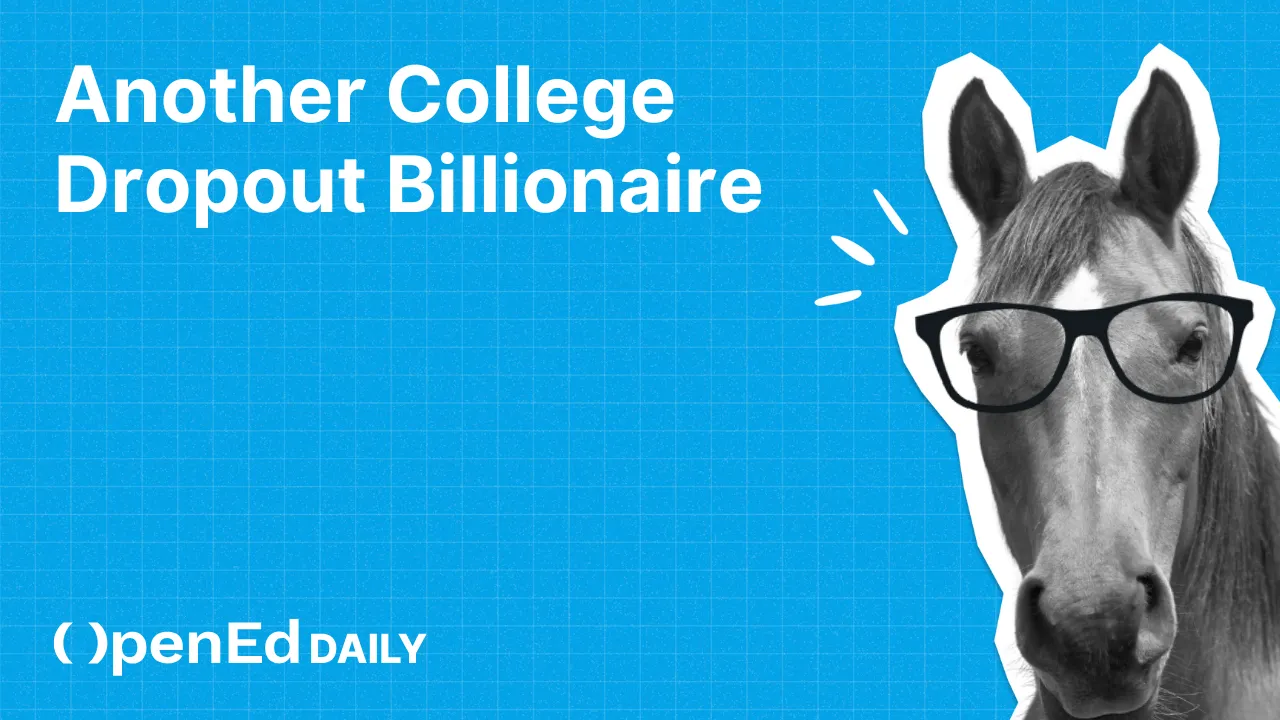
College dropout becomes billionaire (again)
College dropout becomes billionaire (again)
College dropout becomes billionaire (again)
Welcome back to the OpenEd Daily!
If you enjoy this edition, forward this email to a friend.
First time reading? Subscribe and learn more at OpenEd.co.
– Charlie (the OpenEd newsletter guy)
P.S. The OpenEd audiobook has arrived—snag it here!
THOUGHT: Musk's Rule
TREND: Billionaire Dropout Strikes Again
TOOL: The Thiel Fellowship (and other alternative career paths)
Musk's Rule
Elon Musk has a simple test for any requirement: find who created it, ask why it exists. No good answer? Remove it. Michael Gibson, founder of the 1517 Fund, borrowed this approach for higher education while running the infamous Thiel Fellowship: Harvard requires 32 credits to graduate—some 16 in a major, plus electives—but none of that was required for success in technology. The fellowship offered 20 young people (all under the age of 20) $100k to forego or drop out of college to pursue their entrepreneurial ambitions. Harvard's former president Larry Summers called it "the most misdirected philanthropy of the decade." But 13 years later, the fellowship has produced 11 companies worth more than a billion dollars out of 150 total fellows.
Billionaire Dropout Strikes Again
Dylan Field was a junior at Brown studying math and computer science when he spotted a TechCrunch article about the Thiel Fellowship. He applied two hours before the New Year's Eve deadline in 2011, but he had a plan: build better software for drones with his smartest programmer friend, Evan Wallace. Field got the $100K fellowship, shared it with Wallace, and they dropped out to move into a Palo Alto apartment. During their two fellowship years, they pivoted from drones to browser-based design tools and launched the first version of Figma in 2016. Last week, Figma went public at a $71 billion valuation, turning Field into the fourth billionaire to be minted from the Thiel Fellowship. The billionaire college dropout has become something of a meme (see Bill Gates, Mark Zuckerberg, and Steve Jobs, to name a few). If this were an infomercial (it's not), we'd have to flash the words "results not typical" on the screen here. But you can't ignore Field's success as another major data point for the argument that the market doesn't care where you went to school.
The Thiel Fellowship (and other alternative career paths)
The Thiel Fellowship might represent the most extreme option in a spectrum of alternatives to the traditional college path. It's more selective than Harvard or Yale (only 20 people are picked out of thousands of applicants). The risks are bigger, as are the potential rewards. But entrepreneurship more broadly is one of several viable alternative strategies that we explore in our new career prep guide–seven different approaches to building a career without the standard script. Because in a world where 17-year-old welders get $70K offers while college graduates struggle with debt, it's clear the old playbook needs revising. The basic principles are simple: start building, start solving problems, start earning trust. The permission slips are optional.
Subscribe to The OpenEd Daily
Join 20,000+ families receiving curated content to support personalized learning, every school day.
.webp)
.avif)


.png)
.png)
.png)